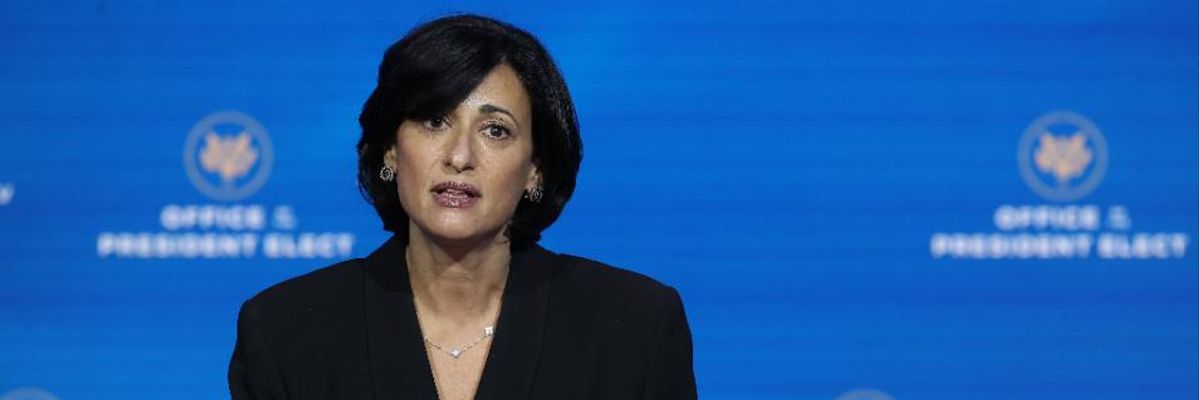A top-to-bottom review of Trump-era coronavirus guidance has identified public health recommendations issued under the banner of the Centers for Disease Control and Prevention that were "not primarily authored" by agency staff or backed by the best existing scientific evidence.
Ordered by current CDC Director Rochelle Walensky, the review (pdf) was seen as confirmation of widespread fears that the Trump administration--members of which repeatedly downplayed the severity of the pandemic--manipulated guidance coming out of the nation's leading public health agency to make it fit with the White House's views and political objectives. In September, Politico reported that Trump political aides reviewed and, in some cases, altered CDC recommendations.
"I am deeply concerned by CDC's findings that the Trump administration undermined the public health response to the coronavirus pandemic by issuing CDC guidance that was at odds with the best available science and in some cases was not even written by CDC scientists," Rep. Jim Clyburn (D-S.C.), chairman of the House Select Subcommittee on the Coronavirus Crisis, said in a statement Monday.
"These findings provide further evidence of the sweeping pattern of political interference in the nation's pandemic response that the select subcommittee's investigations have uncovered," Clyburn added. "The Trump administration put politics over people's lives. I am committed to investigating this conduct fully and taking all steps necessary to ensure that it never happens again."
In a summary of the review's findings (pdf) published on the CDC's website Monday, Anne Schuchat, the agency's principal deputy director, spotlighted a "variety of issues" with coronavirus recommendations released during the Trump administration, including:
a) guidance that was not primarily authored by CDC staff; b) reliance on less directive language (e.g., "considerations") than response leadership felt could be supported by existing evidence; and c) availability of new data or evolving scientific understanding that necessitated updated recommendations. I also found that some recommendations were accompanied by science briefs detailing the evidence-base supporting the guidance, but these supporting science briefs had not yet consistently been produced and/or publicly posted for each major area of guidance.
Schuchat pointed specifically to several documents issued by Trump's CDC that had already been removed or replaced by the time the review was conducted: Guidance from July titled "The Importance of Reopening of America's Schools This Fall," another document from August that relaxed Covid-19 testing guidelines despite internal objections from CDC scientists, and a third from April called "Opening Up America Again."
"While the response typically reviews new evidence in the process of developing guidance and convenes cross-task force deliberations to review the new evidence, there was not a consistent practice of publicizing the supporting evidence in a scientific brief in conjunction with every major new guidance," Schuchat wrote. "We are now committed to providing updated science briefs if there is research to inform guidance updates."
The Washington Postreported Monday that while "the word 'politics' appears only once" in the review, the findings provide "official confirmation of what has been widely reported in press accounts at the time--that political appointees ordered revisions to critical CDC guidance."
"In addition to the three documents not written by CDC staff," the Post noted, "the review also cited recommendations that should have used stronger language and that should have cited supporting scientific briefs."
To remedy the reputational damage the CDC sustained during the Trump years, Walensky vowed a decisive break from the politically motivated and unscientific pandemic guidance that her predecessor, Robert Redfield, allowed to emerge from the agency.
"This is something that I will not allow as CDC director," Walensky said Monday. "The processes we have in place moving forward will ensure this cannot and will not occur."
In a statement to CNN, Walensky said she is "focused on moving CDC forward with science, transparency, and clarity leading the way."
"It is imperative for the American people to trust CDC. If they don't, preventable illness and injury can occur--and, tragically, lives can and will be lost," Walensky added. "This agency and its critical health information cannot be vulnerable to undue influence, and this report helps outline our path to rebuilding confidence and ensuring the information that CDC shares with the American people is based on sound science that will keep us, our loved ones, and our communities healthy and safe."

